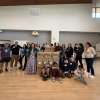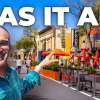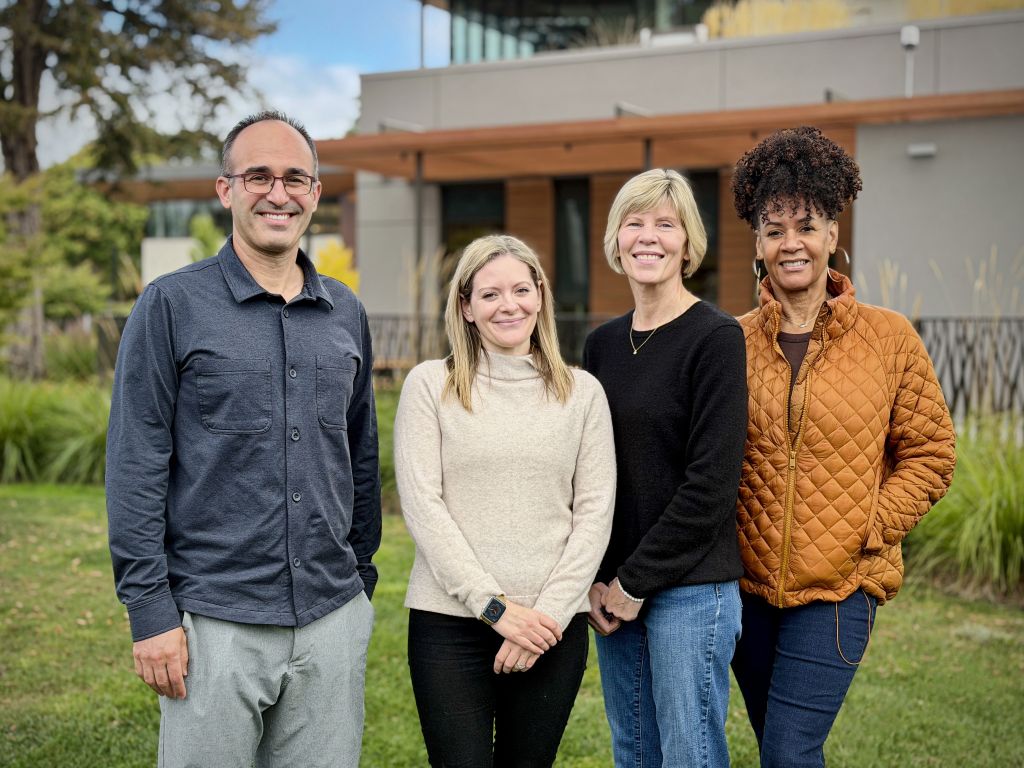650 Stories: An interview with Bego Lozano
Bego Lozano lives in Burlingame, but was born and raised in Mexico City, and has lived in seven cities in four countries. She holds three passports and speaks English, Spanish, and Portuguese fluently. Calling herself a “global nomad” she says that one of the hardest questions for her to answer is: ‘Where are you from?’ She has two children and an 8-year-old boxer who responds to commands in English, Spanish and Portuguese.
Where did you grow up?
I was born and raised in Mexico City, both of my parents were born in Mexico City, and I went to college in Mexico City. I married young at 23, and my husband and I ended up moving to Florida for five years. I worked in marketing for Ericsson, then it was Sony Ericsson—the mobile phones. I was the marketing manager for Latin America. My oldest son was born in Florida, and when he was six weeks old, we moved to Seattle for eleven long months.
How was moving to Seattle?
I went from being an executive and working and having my support system to being a stay-at-home mom. I didn’t have a support system and it was dark. I had two Swedish friends who were also wives of Microsoft guys. But I thought I was a burden to them, because when I saw them they had to switch to talking in English. We lived in the suburbs which was horrible. My son’s name is Diego and every day my neighbor would ask, “How is Diablo doing?” It wasn’t a happy place.
So then what led you out of there?
We were both unhappy and so we moved to New York City. What a change. It was great because I grew up in a big city. Moving to New York was a breath of fresh air. Even though the weather was harsher, there were so many more opportunities. We also knew from our experience in Seattle that we needed to tell people we were moving there, and make sure to contact people. I wasn’t shy. I knew I had to reach out and build a support system. I asked people where I should live and what I should do. We moved to the Upper East Side which is very family oriented which made sense because our son had just turned one. We were there for five years. Our daughter was born there, and because it was the dot com era I had an online tea shop.
So in the first dot com wave you switched careers and became an entrepreneur?
Yes. I thought, ‘My brain is going to die if I don’t do something, other than being a mom.’ My business was called Tea Boutique and we sold loose leaf tea and my favorite thing was the tea of the month club. It was great until it was too much work and then I thought, ‘Oh my god what am I going to do?’ At the same time my husband had left his job and opened an ad agency focused on the hispanic market. I started pitching in and that was paying me more than my tea business, so we sold the tea business to these people that we knew that had an online grocery store.
Then what happened after that?
The financial crisis came along and the first thing advertisers did was cut their hispanic marketing funds so suddenly the agency was not a good business anymore. We decided to move back to Mexico City because we wanted our kids to have the same sort of experience we did growing up with grandparents and cousins around. We wanted them to learn to speak Spanish properly and have them be fully bilingual. When we moved back to Mexico City, we fit right into our family and society, and we said to ourselves that we would live there forever.
How did you know about the Junior League?
I started volunteering with them when I was in 7th grade. In 7th grade there was a huge earthquake in Mexico City where many people died. These women were looking for youth volunteers to be involved in the community. The project for that year was doing a census of kids that lost their homes in the earthquake, and then making shoeboxes to deliver to those kids. They asked us to make a shoebox with something special for each child. Inside we put something not super expensive inside, like coloring books and maybe even a toothbrush and toothpaste. They needed children to help deliver these boxes, and that experience changed my life. In Mexico Christmas is not as big as it is in the US, but the Three Kings Day is huge, and that’s when we went. It was amazing to see the faces of those little kids when they came out and we delivered these boxes. They had lost everything. They were living in temporary housing that the government had provided. Delivering those boxes absolutely changed my life. I thought to myself that when I grow up, I want to be like those women who organized this amazing program.
So when you returned to Mexico City, you fulfilled that dream?
Yes, I was now the adult mentor. I did environmental awareness programs, where we went to schools and talked to kids; it was so much fun and important. Then they asked me to be the Communications VP. So I did that, and my husband said I was working more than people who get paid. But that’s what volunteers do. So while I was very happy doing that work, I also wanted to do something career-wise. Then my husband was offered a job in Sao Paulo. I remember crying so hard because I didn’t want to leave Mexico City. They had just asked me to be the president of the Junior League, and that was my dream, but it was a volunteer role. It was a very tough decision to make. We told ourselves that we’d go to Sao Paulo for two years, maybe three, and then come back. We went to Sao Paulo and it was amazing. We were there for four years. Once we were settled in, I reached out to a colleague I had worked with at Ericsson in Miami for coffee. She told me there was this German guy looking for trainers and she thought I would be a perfect fit. But I’m not a trainer, I told her. But I met with that German guy, and he’d just won the account of Daimler for doing intercultural training.
What does that mean exactly? Intercultural training?
What that means is you help people be successful in a culture different from their own. Not necessarily telling them where to shop and how to get a driver’s license, but how to work. For example, with Brazilians it’s very important you ask them about their family. In the US, if people ask you about your family you might think they’re a nosy person. Germans, for example, wonder why people in the US are always asking them how they are. Don’t I look well? My job is to explain to them that ‘How are you?’ is like saying ‘Hi.’ I have to tell them, ‘When people say, ‘How are you?’ in the US, they don’t really want to know how you are.
How did you take to this new role?
It was a whole new area of knowledge for me, like the intersection between business and psychology. The Daimler trainees would come to Sao Paolo, and I would do these multiple-day trainings with them. Although I taught them, I also learned a lot. A mind-boggling amount.
But eventually you left Sao Paolo and moved here, to Burlingame.
Yes. Our son was approaching high school and we had a very small window and we wanted him to start his freshman year in the U.S. and we had our daughter trailing two years behind him. Initially we were going to live in Marin, but then my husband’s colleague had bought their house here in Burlingame, and told us not to live in Marin, because then we’d be tied to jobs in the city, whereas if we moved to Burlingame, we could have 50 miles of jobs and opportunities for the kids within our reach.
So your son started high school here?
I love the community. It’s a very strong community. Everyone looks after each other. People are really committed to the community and the public schools are very good in part because of the parent organizations that support them. The teachers are not only good teachers but they’re good people. I’ve heard so many stories about teachers at Burlingame High School asking students if they are okay. The fact that those teachers are so connected to the students is a reflection of the community.
What are some of the things you learned about people and culture from your work as a trainer?
Culture is like water for fish. Fish don’t know they’re in the water. You don’t know why you do stuff because you’ve always done it that way. When people ask me how business lunch is in Mexico, I tell them that we don’t talk about business until dessert comes. I also learned that no matter what your background is, if you have clear objectives of where you want to get to there are a thousand ways to get there. You need trust, which is why I always told my trainees be authentic. Don’t try to become Brazilian or German. Then you lose that trust. People know when you’re faking it, and once they know you’re faking it, and you’ve broken that trust, it’s over. The only way to do business in the world is with trust. Some cultures rely more on it, some less, but in the end it boils down to trust.
What are some other quirks around business that you’ve learned?
In Brazil, people eat pizza with a fork and knife. Our first night out eating pizza was a bit uncomfortable – we found ourselves eating pizza as we do in the USA and other countries, and everyone was looking at us like we were some savages. In most of Europe it is common to have a glass of wine with lunch; that is frowned upon in the US. In Western societies eye contact is crucial to confirm interest, in the US it is more split-second and for example in Italy it is intense. I train a lot of Germans who come to the area, and they want to know why people put from 6-8 on party invitations. Here, there’s a clear difference between personal and professional. For Germans you might have dinner, then go to the fireplace and talk, and that never happens here. You have dinner, say thank you very much, see you next time, and that’s it. Another difference is Germans have analysis paralysis. Until everything’s absolutely perfect they don’t release it to the market. Americans release a beta version then users are mad, then the company puts out a patch or fixes it.
Was it easy for you to adapt to the different cultural settings you’ve lived in?
It starts with you. If you start with the difference then it’s hard, but if you start by saying in the end we’re human beings, then it’s easier. And learn some words. At least show that there’s a bit of interest in their culture and language, right? It starts with what you’re bringing. In my trainings I sometimes put on yellow sunglasses to see the yellow culture, then I put blue glasses over those. It’s not blue now, it’s green. It’s a combination, and reminds us that what you bring changes what you see. It also helps to ask questions with curiosity. Not questions like why are you doing this, but really curious questions. Kindness and curiosity will take you a long way.
This article is copyrighted by Raziel Ungar and may not be reproduced or copied without express written permission.










